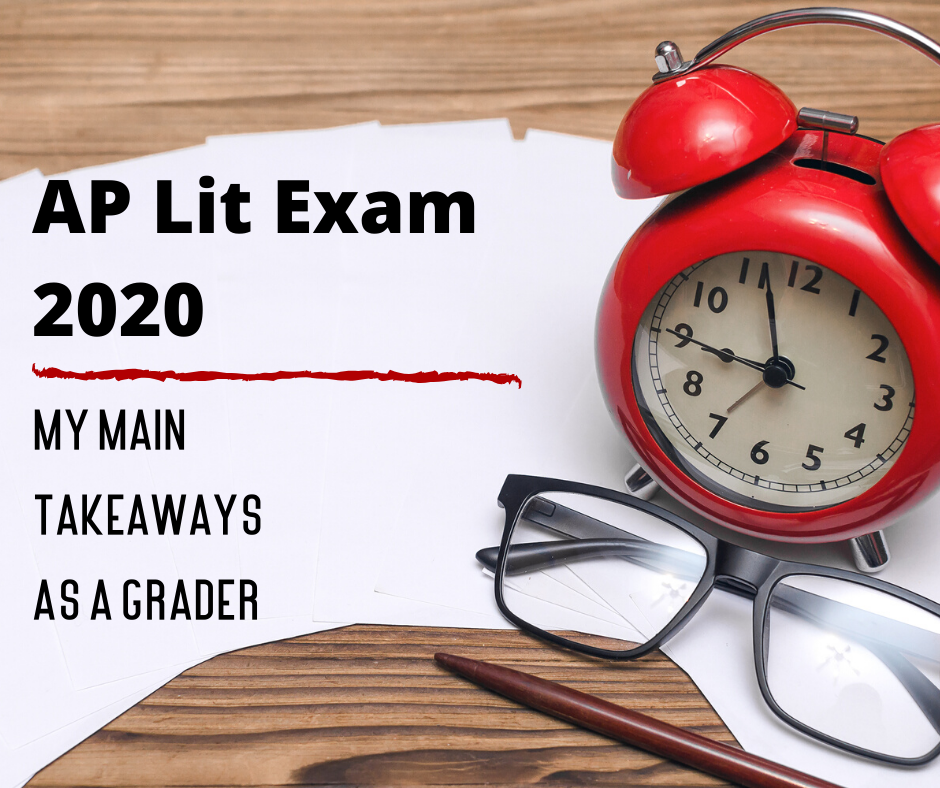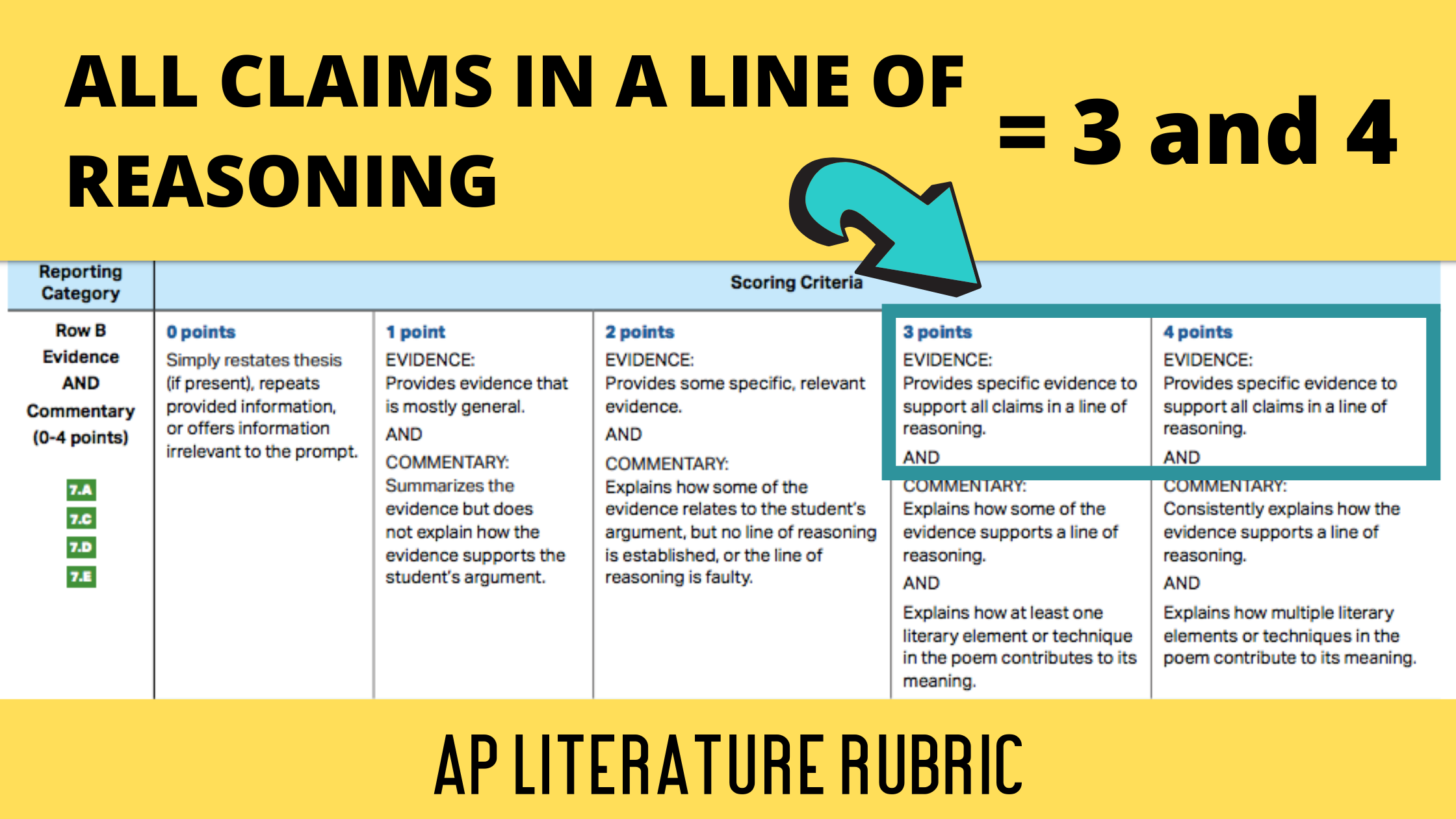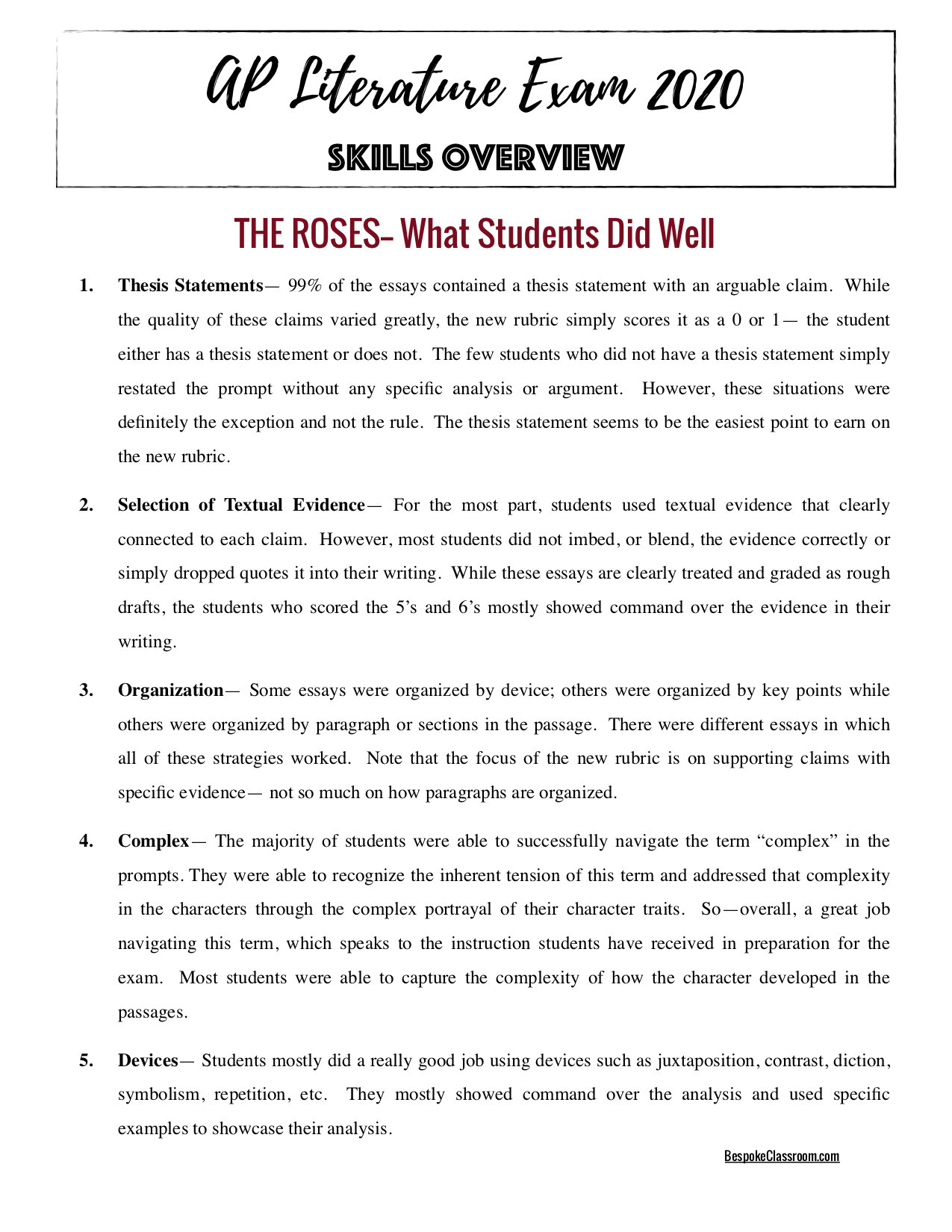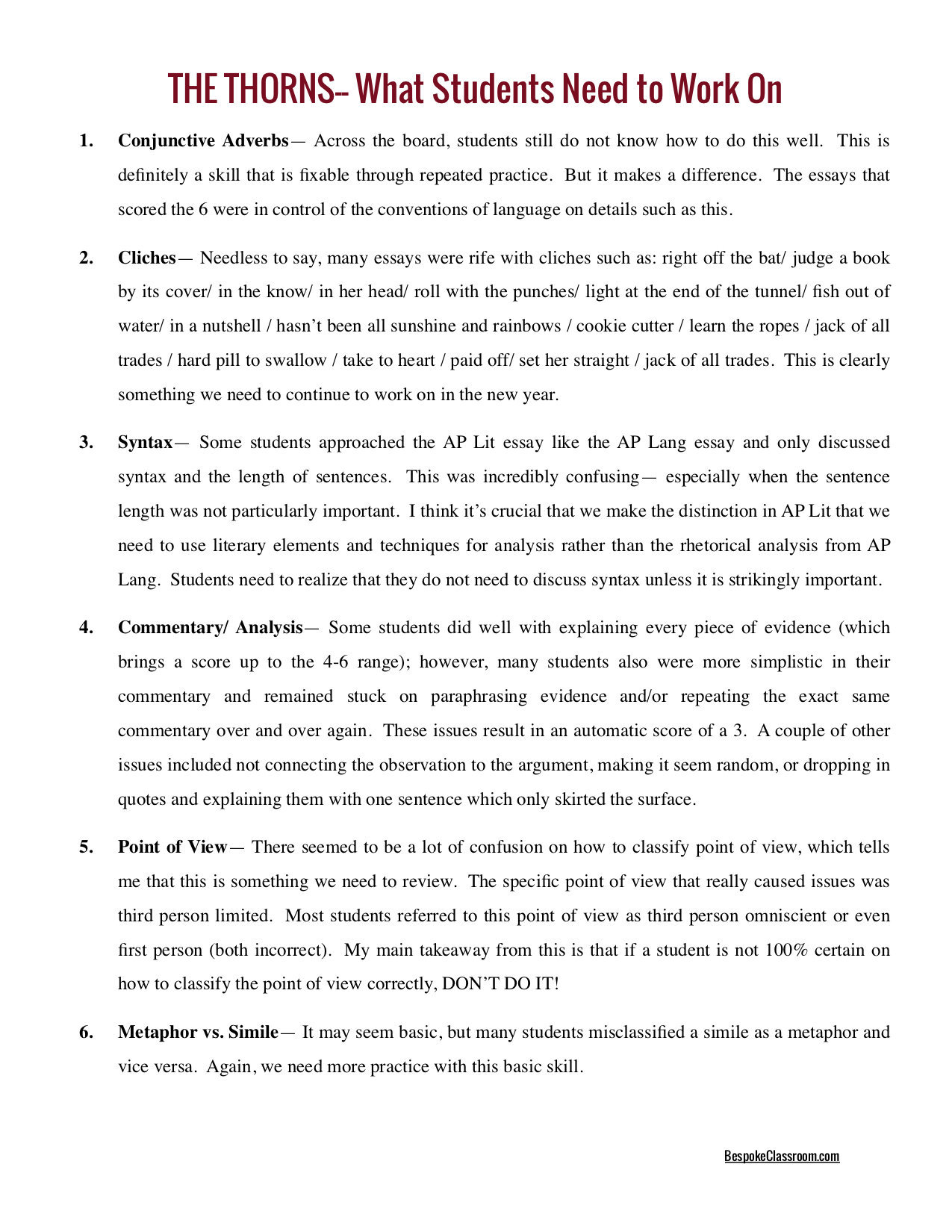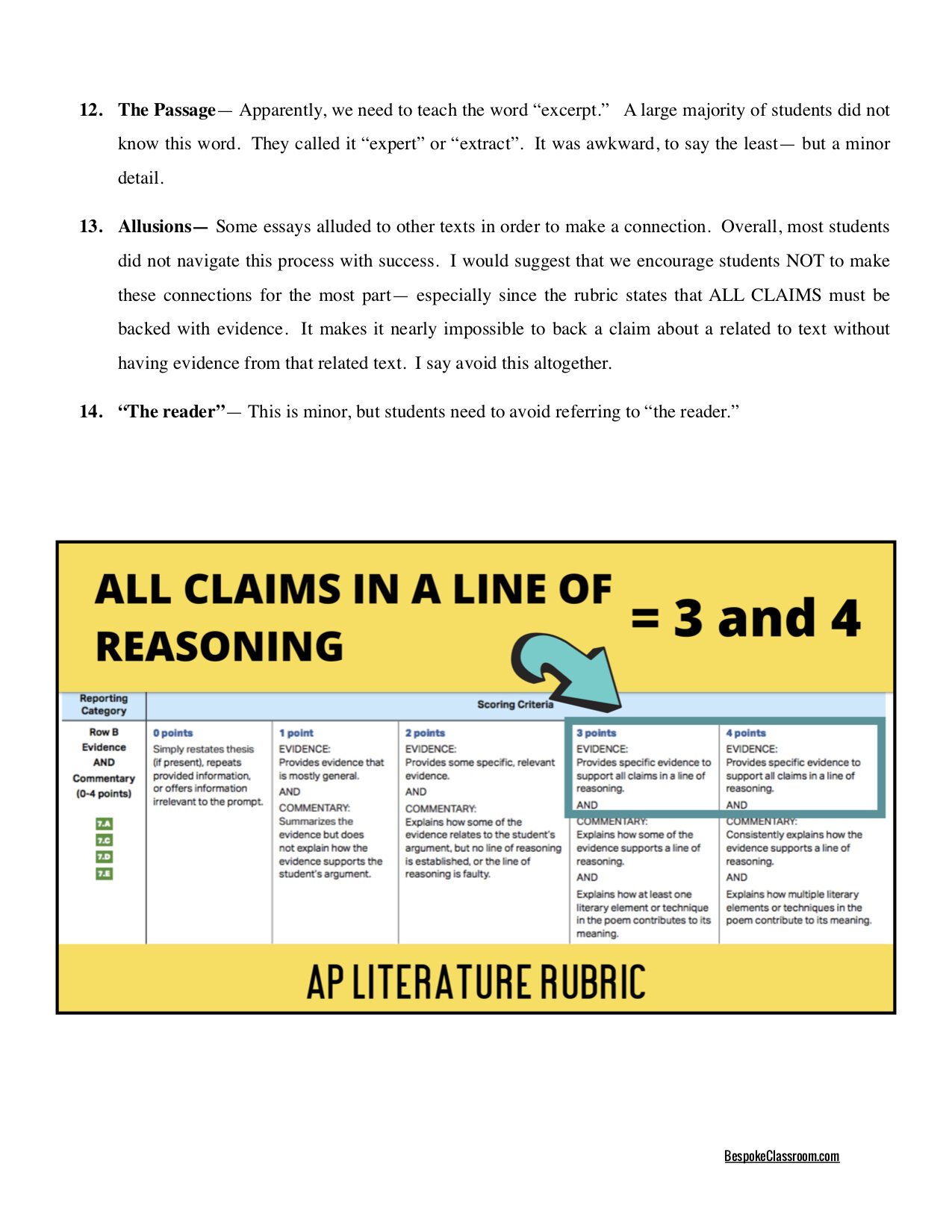This year marked an unprecedented year for AP grading. Not only did students write essays online (or photograph their hand-written essays), but they also only wrote ONE of the traditionally THREE essays with no multiple-choice section. This was also the first time that the exams were scored virtually online. The actual grading process was very streamlined and easy to use. In fact, we finished an entire day early— and this has never happened in the history of grading this exam.
As I graded 500+ essays for the 2020 exam, I created a skills list of roses and thorns (positives and negatives) to help inform our instruction in AP Lit for the upcoming school year using the new rubric. Please note that I am NOT divulging any specific information about the exam itself in terms of the passages and prompts— or any specifics about student essays for that matter.
I am hoping that this list will help inform our skills focus in the 2020-21 academic year. I think you will see that many of these skills are common problems that we typically face as AP teachers, but there were a few standout issues specific to the new rubric that proved to be an enlightening experience for me as a grader.
The Roses
To start off, I want to address the positive aspects of what I observed in student essays.
Thesis Statements— I would say 99% of the essays I graded contained a thesis statement with an arguable claim. While the quality of these claims varied greatly, the new rubric simply scores it as a 0 or 1— the student either has a thesis statement or does not. The few students who did not have a thesis statement simply restated the prompt without any specific analysis or argument. However, these situations were definitely the exception and not the rule. The thesis statement seemed to be the easiest point to earn on the new rubric.
Selection of Textual Evidence— For the most part, students used textual evidence that clearly connected to each claim. I was really happy to see this in action. However, most students did not imbed, or blend, the evidence correctly or simply dropped quotes into their writing. While these essays are clearly treated and graded as rough drafts, the students who scored the 5’s and 6’s mostly showed command over the evidence in their writing.
Organization— Some essays were organized by device; others were organized by key points or even by paragraph in the passage. I can’t say that one strategy was more effective than another. I saw cases where they all worked. Note that the focus of the new rubric is on evidence and backing claims with specific evidence— not so much on how paragraphs are organized.
Complex— I was pleased to see that the majority of students were able to successfully navigate the term “complex” in the prompts. They were able to recognize the inherent tension of this term and addressed that complexity in the characters through the complex portrayal of their character traits. So—overall, they a great job navigating this term, which speaks to the instruction students have received in preparation for the exam. Most students were able to capture the complexity of how the character developed in the passages.
Devices— Students mostly did a really good job using devices such as juxtaposition, contrast, diction, symbolism, repetition, etc. I was really happy to see students show control over using devices to analyze the passages. They mostly showed command over the analysis and used specific examples to showcase their analysis.
The Thorns
These are the skills that we need to continue to focus on moving forward into next school year:
Conjunctive Adverbs— Across the board, students still do not know how to do this well. This is definitely a skill that is fixable through repeated practice. But it makes a difference. The essays that scored the 6 were in control of the conventions of language on details such as this.
Cliches— Needless to say, many essays were rife with cliches such as: right off the bat/ judge a book by its cover/ in the know/ in her head/ roll with the punches/ light at the end of the tunnel/ fish out of water/ in a nutshell / hasn’t been all sunshine and rainbows / cookie cutter / learn the ropes / jack of all trades / hard pill to swallow / take to heart / paid off/ set her straight, etc. This is clearly something we need to continue to work on in the new year. Students are relying upon cliches to do the analysis for them, and it just does not work.
Syntax— Some students approached the AP Lit essay like the AP Lang essay and only discussed syntax and the length of sentences. This was incredibly confusing— especially when the sentence length was not particularly important. I think it’s crucial that we make the distinction in AP Lit that we need to use literary elements and techniques for analysis rather that the rhetorical analysis from AP Lang. Students need to realize that they do not need to discuss syntax unless it is strikingly important.
Commentary/ Analysis— This was kind of a mixed rose and thorn experience for me as a grader because some students did well with explaining every piece of evidence (which brought their score up to the 4-6 range); however, many students also were more simplistic in their commentary and remained stuck on paraphrasing evidence and/or repeating the exact same commentary over and over again. These issues result in an automatic score of a 3. A few other problems included not connecting the claim to the argument, making it seem like a random observation, or dropping in quotes and explaining them with one sentence that only skirted the surface.
Point of View— There seemed to be a lot of confusion on how to classify point of view, which tells me that this is something we need to review. The specific point of view that really caused issues was third-person limited. Most students referred to this point of view as third-person omniscient or even first-person (both incorrect). My main takeaway from this is that if students are not 100% certain on how to classify the point of view correctly, they shouldn’t do it. I don’t think it’s actually necessary to label the point of view as much as it is to discuss how the point of view impacts the message.
Metaphor vs. Simile— It may seem basic, but many students misclassified a simile as a metaphor and vice versa. Again, we need more practice with this basic skill.
Personal Judgments— There is an inherent flaw when a student argues how “most people would react” or what it means to react “normally.” Students need to stay inside the world of the text and avoid expressing their unfounded judgments on a situation because no one can prove what a “normal person” would do in any situation.
Vocabulary Issues— In an attempt to use academic language, students used some incorrect vocabulary— or even invented their own WORDS! For example, many students used the word uncomfort instead of discomfort, or unbelonging vs. not belonging. In other attempts to use sophisticated vocabulary, some students invented their own words such as “tryance” and “complexifies” in order to make their writing sound more academic. This made me realize that we need to continue working on using sophisticated vocabulary with accurate terms.
Supporting Claims with Evidence— It is CRUCIAL to note that on the new rubric, scores of 4, 5, and 6 state that ALL claims are supported by textual evidence. ALL— that means every single claim! It was surprising to see that the essays in the 3 score range ran the gamut from four-sentence essays to three-page, fully developed essays. If they had any claims that were key to their arguments without evidence, that knocked them down to an automatic 3. This was the most eye-opening part of the grading experience for me because there were several 5-6 level writers who ended up with 3’s because they had a few unsubstantiated claims. Some of these essays launched into unfounded historical connections that contained no evidence. I also noticed a trend of students using more claims without evidence towards the end of their essays, which I think was a result of running out of time and panicking. It really felt like some students got to the end of the essay and then panicked about the time and decided to spit out as much analysis as they could without any evidence. Unfortunately, this took them down to a 3.
Judging the Author/ Wasted Words— I did see a lot of writers trying to sound academic by critiquing the author’s work with some wasted words such as: expertly, exquisitely, plethora, good job of, the author perfectly describes, wonderful literary embellishment, the author did an amazing job with this, masterfully, etc. These kind of critiques come across as arrogant and do not add any strength to the argument. In fact, they are simply wasted words meant to attempt to sound academic but unfortunately do not.
Considering the Audience— I encountered several essays in which students defined literary terms. This is essentially an audience problem. We need to reiterate with our students that their audience consists of experts in the field and that we do not need to be told the definition of a metaphor or imagery, etc. This just ends up detracting from the sophistication of the overall essay.
The Passage— Apparently, we need to teach the word “excerpt.” A large majority of students did not know this word. They called it “expert” or “extract”. It was awkward, to say the least— but a minor detail.
Allusions— Some essays alluded to other texts in order to make a connection. Overall, most students did not navigate this process with success. I would suggest that we encourage students NOT to make these connections for the most part— especially since the rubric states that ALL CLAIMS must be backed with evidence. It makes it nearly impossible to back a claim about a related text without having evidence from that related text. I say avoid this altogether.
“The reader”— This is minor, but students need to avoid referring to “the reader.” I know we tell them this over and over again… but apparently, we need to keep on preaching it!
So those are my main takeaways from the 2020 AP Lit exam. Do you have any other insights to add to this list? I’d love to hear from you. Please leave a comment below!
FREE DOWNLOAD FROM THE FREEBIE LIBRARY
Subscribe today to gain access to 50+ freebies like this one to use in your secondary ELA classes today!
About the Author
Meredith is the founder and creator of TeachWriting.org and Bespoke ELA. She has taught high school English for 10+ years in Dallas, Chicago, and New York City and holds a M.A. in Literature from Northwestern University. She has always had a connection to the written word-- through songwriting, screenplay writing, and essay writing-- and she enjoys the process of teaching students how to express their ideas. Meredith enjoys life with her husband, daughter, and sweet pups.


